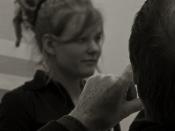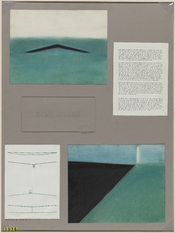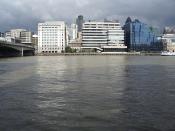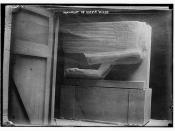In Robert ShultzÃÂs poem entitled ÃÂVietnam War Memorial, Night,ÃÂ we get to visit the memorial in two different contexts. On the surface, we get visual descriptions and details of the monument physically that allow us to picture clearly what it must be like to actually be there. However, a closer read into the poem reveals a different perspective. Hidden under the surface, the author takes us back to the war itself. We are left wondering throughout the poem what the authorÃÂs true feelings are. He seems to view the monument in a negative light. He describes the monument as ÃÂjabbing the air,ÃÂ which can be assumed to be a negative connotation. At the end of the poem, we are relieved to find that the author is able to leave the monument cleansed. This is significant because it is something he would not have been able to had he not visited the monument.
Each stanza in the poem describes the monument itself but under the surface, we get the feeling of being back in the war. There are many references to war-like things and scenarios. There are many words used to describe the memorial that clearly paint a picture of war-like scenes. In the second stanza we get the feeling that weÃÂre sneaking through a swamp. The author says, ÃÂÃÂ I step forward carefully somewhere near the open trench.ÃÂ The authorÃÂs choice of words is clearly deliberate. He uses the word ÃÂtrenchÃÂ which is a word often associated with the Vietnam War, or any war.
As we continue reading, tension seems to build. There seems to be an ever growing danger. In the third stanza the author says, ÃÂChoppers shuttle across the sky with jets for National crying down.ÃÂ We can picture the author, or any solider traveling through swampy trenches with choppers flying overhead. We can imagine the element of fear the soldiers and the author must have felt. He continues in the fourth stanza saying, ÃÂThere are others here: white T-shirts drift in heavy air.ÃÂ He doesnÃÂt travel alone, but we have to wonder if the other ÃÂsoldiersÃÂ are dead or alive. The heavy air would suggest the soldiers are dead and the word drift suggests they are floating in the swamp. This continues to add to the tension that has been building up.
More evidence points to death. He says, ÃÂAt first we are only ankle deep in the names of the dead, but the path slopes down. Quietly, we wade in.ÃÂ The author is literally describing what itÃÂs like to walk along the monument looking at the names of the dead. However, this has a deeper meaning for him. He recalls what it was like to be in the war wading through swamps with the bodies of dead soldiers all around. It is obvious that visiting the monument is a very difficult thing for the author to do. He is confronted once again with the horrors of the Vietnam War that perhaps he had suppressed previously.
The tension finally boils over starting with the second to last stanza. The author is actually touching the names of the dead on the monument and becomes completely overwhelmed. He says, ÃÂTo touch an absence carved awayÃÂ Particular deaths rush out at them. The minds of veterans gape like tunnels.ÃÂ ItÃÂs as if the author feels some resentment that he survived and these soldiers did not. He goes on saying, ÃÂWe are over our heads. We cling to each other like all the restÃÂ ÃÂ Many soldiers felt that the United States was ÃÂover its headÃÂ during the war but he refers to the commradery the soldiers had for each other. For me, this is the most important line in the poem. The author prior to visiting the monument, felt resentment that he had survived the war and that his fellow soldiers did not. However, the Vietnam War was very much opposed by the American people. Soldiers were not welcomed when they returned, if they returned at all. There was also a draft in place meaning there were many under trained men fighting in the war. This must have brought them closer together. The soldiers were a group not respected by their American people. I think the author remembers the relationship he shared with the soldiers which helps him heal.
The very last sentence relieves the tension the built up throughout the poem. The author is able to walk away with a feeling of being ÃÂcleansed.ÃÂ He is able to leave the monument and the war behind. He says, ÃÂÃÂ And climb away with altered steps.ÃÂ He uses the word ÃÂalteredÃÂ in a positive sense. In the beginning of the poem he describes the war and the monument in a negative light. He depicts the negative aspects of the war in comparison with the monument. However, by the end of the poem his perspective has changed. He has an ÃÂalteredÃÂ piece of mind.
BibliographyRobert ShultzÃÂs poem entitled ÃÂVietnam War Memorial, Night"





